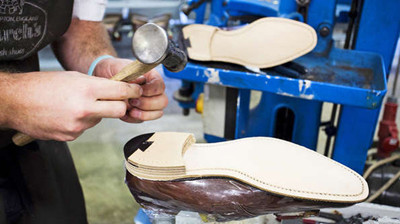制鞋业
Asian brogue
亚洲花皮鞋
Exports help to revive the high end of Britain's decimated shoe industry
进口帮助拯救英国衰落的高端制鞋业
FROM the attic of his cramped old factory in the middle of Northampton, Stephen Etheridge, the head of Church's, a shoemaker, gazes down on the deserted bus station next door. He explains how his company will soon be expanding to fill the four-acre (1.5-hectare) site, creating 100 or so jobs in the process. The move has caused a stir in Northampton, about 70 miles north of London, as it is the first time in living memory that a shoe company is growing rather than closing. The recent success of a venerable old firm like Church's, founded in 1873, reflects a wider revival of Northampton's luxury shoemakers, buoyed by the insatiable Asian appetite for a bit of old English craft and class.
北安普顿中部,在他狭窄又老旧的工厂阁楼里, Church's鞋业公司的老板Stephen Etheridge凝视着隔壁废弃的汽车站。他解释说他的公司将很快进行扩建,重新利用这四英亩(1.5公顷)的土地,这个过程会创造约100个工作机会。这一行为在位于伦敦北部约70英里的北安普顿引起了轰动,因为这是人们记忆中第一次有鞋厂要扩张而不是倒闭。成立于1873年的Church's公司令人尊敬而又历史悠久,它最近的成功反映了北安普顿高端鞋业的广泛复兴,这是由亚洲源源不断地追求经典英格兰工艺和品位的欲望而提振的。

There was a time when the city of Northampton and its surrounding towns did little else but produce shoes. The industry there employed tens of thousands of people in hundreds of factories, small and large; fortunes were made making millions of boots for the army during the first world war. But that era of mass manufacturing came to a calamitous end in the 1980s as production moved overseas to take advantage of cheaper labour. Now Britain imports almost all its shoes. There were fears that the whole industry might become extinct. But posh bootmakers like Church's, Joseph Cheaney and Loake clung on. They employ hundreds of people each, rather than the thousands of old Northampton, but they have now found a very profitable niche in the global market and are prospering as never before.
曾几何时,北安普顿和周边城镇专致于制鞋。在这个行业里,大大小小几百个工厂雇佣了好几万工人;一战期间因给军队制作几百万双靴子而大赚了一笔。但大规模制造的时代在20世纪80年代惨淡收尾,原因是为利用廉价劳动力,生产都挪到了海外。如今英国所有的鞋几乎都是进口的。有人担忧这整个产业也许会就此消失。但像Church's, Joseph Cheaney和 Loake这样的奢侈鞋业公司坚持下来了。它们各雇佣几百人,而不是像以前的北安普顿一样雇佣几千人,但他们在国际市场发现了盈利之处,正在史无前例地繁荣发展着。
Loake is still a family-run firm, making shoes in the same factory in nearby Kettering that the founding brothers built in 1894. Like all the area's luxury cobblers Loake only makes “goodyear welted” shoes, a 300-year-old process whereby the shoe is stitched together. This time-consuming and expensive technique gives the footwear strength and durability. As Andrew Loake, the current head of the company, explains, all shoes used to be made like this until the advent of cheaper injection-moulding. “So,” he explains, “our shoes have moved from being mass-commodity items to being specialist and different.”
Loake还是一个家族企业,其制鞋厂为Loake家族三个兄弟于1894年在凯特灵附近建立,如今他们依然在这里制鞋。就像所有地方的奢侈鞋业一样,Loake只制造“固特异工艺”的鞋,这是一种将鞋子缝合在一起、拥有300年历史的工艺。这种耗时又昂贵的技术使鞋子有了强度和耐久性。现任董事长Andrew Loake解释说在更廉价的注射成型技术出现之前,所有的鞋子都是这样做的。
In that sort of market, argues Mr Loake, the only way to go is to make shoes better rather than cheaper. His company now uses higher-quality leather than it did in the 1980s. Each shoe takes eight weeks to make, involving about 200 processes. Some of these haven't changed for a long time. But that is exactly what new consumers, particularly in Asia, want to pay for. Exports now account for over one-third of its sales, and have been increasing steadily over the past decade. Loake's biggest export market is Sweden. Its second-biggest is South Korea, reflecting, says Mr Loake, “a hunger for high-quality goods” in Asia.
Loake先生表示,在那样的市场中,唯一的方式就是让鞋子更好而不是更便宜。他的公司如今用的高质量皮革比20世纪80年代用的还好。每一只鞋都要花八周来完成,包括约200道工序。有些工艺在很长一段时间内都没有变过。但这正是新的顾客群,尤其是亚洲顾客所想花钱购买的。现在出口已经占了销售量的三分之一以上,自从过去十年来就一直在稳步增长。Loake最大的出口市场是瑞士。第二大出口国是韩国,Loake先生说这反映了亚洲对“高品质商品的渴求。”
Church's is also doing well in the East. Although it is now owned by Prada, an Italian luxury-goods company, it sells itself as the quintessential English manufacturer. To control the Church's brand, it sells almost half of its products through its own bespoke shops—four in Hong Kong, two in Shanghai, and one in Singapore. It is trying to open one in Beijing, too. Prices are steep, rising to £1,000 ($1,500) a pair. But, even producing 5,000 pairs a week, the company cannot meet demand—hence the expansion of their factory in Northampton. If the 21st century does belong to Asia, at least its masters will be well-shod.
Church's公司在东方的表现也不错。尽管它现在在意大利奢侈品公司Prada的旗下,它仍以经典英国制造商为卖点。为了维护Church's的品牌,它约半数的产品都通过店铺订做——香港有四家店,上海两家,新加坡一家。它也正规划在北京开一家店。鞋子价格不菲,涨到了约1000英镑(1500美元)每双。但是尽管每周都生产5000双鞋,该公司依然供不应求-所以才需要位于北安普顿的工厂扩建。如果21世纪确实属于亚洲,起码这个世纪的主人穿的鞋还不错。译者:王颖 校对:石海霞













